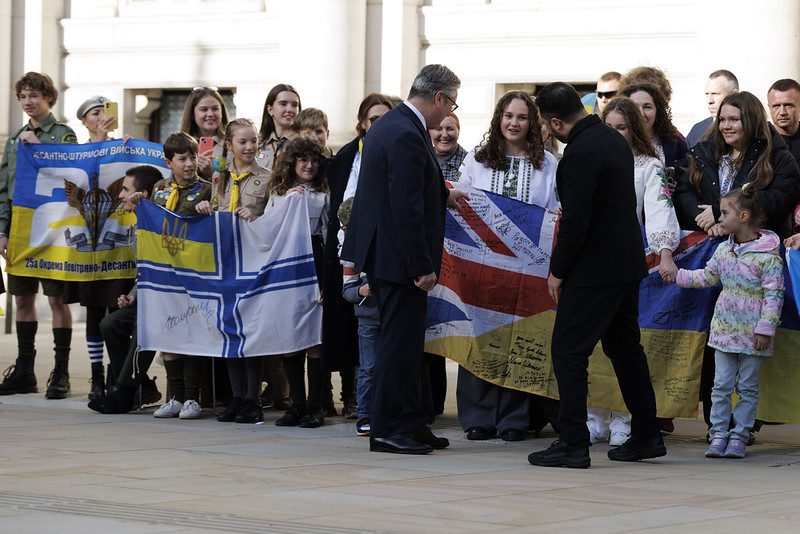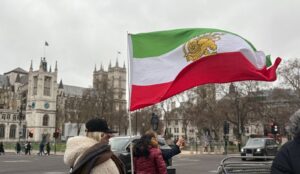The latest meeting of the ‘Coalition of the Willing’ in London, hosted by UK Prime Minister Keir Starmer and attended by Ukrainian President Volodymyr Zelenskyy and over two dozen other European leaders, marked a significant diplomatic and strategic push to intensify pressure on Russia as the conflict heads towards its fourth winter. The summit produced a five-point action plan focusing on crippling Moscow’s economy and bolstering Kyiv’s defensive and offensive capabilities.
A New Economic Onslaught: Sanctions and Seizing Assets
The primary focus of the London talks was delivering a “maximum pressure” campaign against Russia’s vital energy sector. The timing was highly symbolic, coming immediately after the US, under President Trump, imposed new sanctions on Russia’s two largest oil companies, Rosneft and Lukoil.
The move was designed to put pressure on Russia’s allies, notably China and India, to make it harder for them to buy their oil. Shortly after the move, China’s state oil companies halted seaborne Russian oil imports from Rosneft and Lukoil.
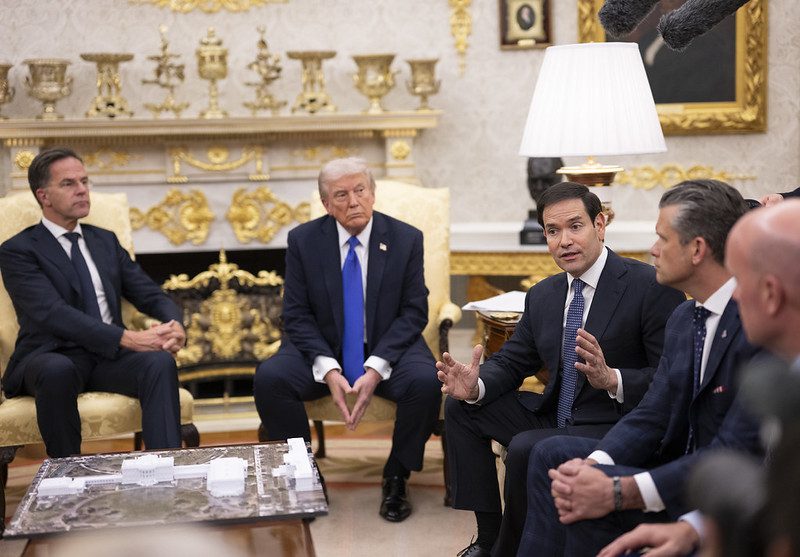
Image: President Donald Trump speaks with members of the media alongside NATO Secretary General Mark Rutte, Secretary of State Marco Rubio, and Secretary of War Pete Hegseth – Molly Riley / White House
Starmer hailed the decision, stating that Trump was “right to have imposed sanctions on Russia’s oil majors” and stressing that this collective action was “choking off funding for Russia’s war machine.” He urged other countries to follow suit to accelerate the goal of taking Russian oil and gas “off the global market”.
This strategy was supported by the European Union’s 19th package of sanctions, which further targets Russian energy and financial loopholes. French President Emmanuel Macron, speaking from Paris, emphasises that the US sanctions were “clearly a turning point” in the conflict, signalling a new, more unified willingness by the West to target Russia’s core revenue streams.
The Battle for Billions
A key commitment was to accelerate work on releasing funds from Russia’s frozen assets to finance Ukraine’s defence and reconstruction. Keir Starmer urged allies to “finish the job on Russia’s sovereign assets and unlock billions” for a reparations loan. EU chief Ursula von der Leyen confirmed that the bloc would present plans for a reparations loan “soon”. The political momentum behind this move is now undeniable, even as technical and legal questions remain, particularly with countries like Belgium, where a large portion of the assets are held. For Kyiv, as Zelenskyy noted, these funds are “crucial” for both military procurement and energy infrastructure defence ahead of the winter.
Ukraine and Missiles: Strengthening Kyiv’s Reach
The delivery of advanced weaponry, particularly long-range missiles, emerged as a non-negotiable priority for the coalition.
Starmer committed that the UK’s missile production program was “accelerating” to provide Ukraine with more than 5,000 lightweight multirole missiles, with an additional 140 being delivered ahead of schedule. He explicitly stated the UK was “pushing the case” for Ukraine to have long-range missiles, recognising they are “really important” to its war effort.
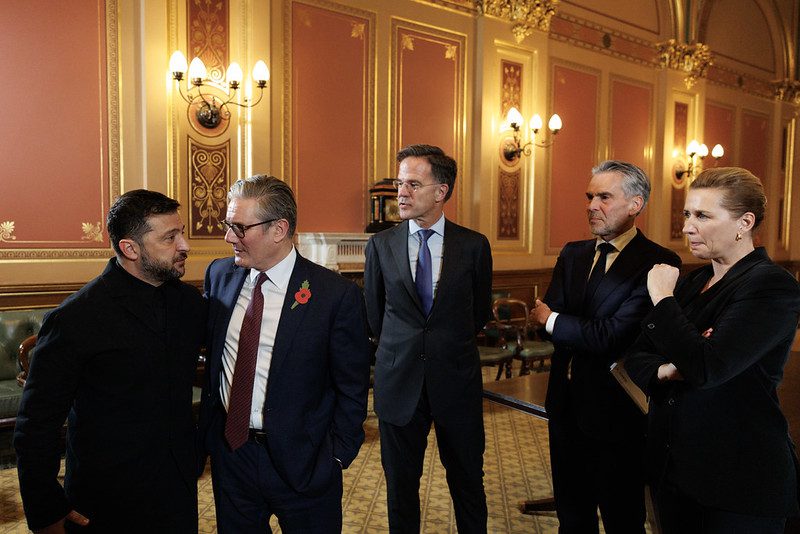
Image: Prime Minister Keir Starmer hosts a Coalition of the Willing meeting alongside President of Ukraine Volodymyr Zelenskyy, Prime Minister of Denmark Mette Frederiksen, Prime Minister of the Netherlands Dick Schoof and Secretary General of NATO Mark Rutte – Lauren Hurley / No 10 Downing Street
Zelenskyy reiterated his appeal for powerful long-range strike capabilities, including US-made Tomahawks, arguing that this capacity is essential to force genuine negotiations by enabling Ukraine to inflict damage deep inside Russian territory.
NATO Secretary-General Mark Rutte confirmed that the provision of US Tomahawk missiles remains “under review” by President Trump following their recent talks, a point that keeps the door ajar for a major increase in Ukraine’s military reach.
However, amid the meeting, reports confirmed that Russia’s fourth-largest oil refinery, the Ryazan Plant, was forced to halt operations after catching fire following a Ukrainian drone attack, underscoring Kyiv’s increasing capability to hit Russia’s critical energy infrastructure.
Moscow’s Defiance and Diplomatic Rifts
The diplomatic pressure was immediately met with defiance from Moscow. Russian President Vladimir Putin called the new US sanctions an “unfriendly act” but insisted they would not have a significant economic impact, though he conceded “some losses are expected”.
Meanwhile, senior Russian officials sought to sow division. Putin’s special envoy, Kirill Dimitriev claimed that “various forces”, specifically the UK and European nations, are actively attempting to “derail dialogue” between Trump and Putin. Russian foreign ministry spokesperson Maria Zakharova lashed out at the EU’s 19th sanction package, accusing the bloc of trying to play the role of “global policeman”.
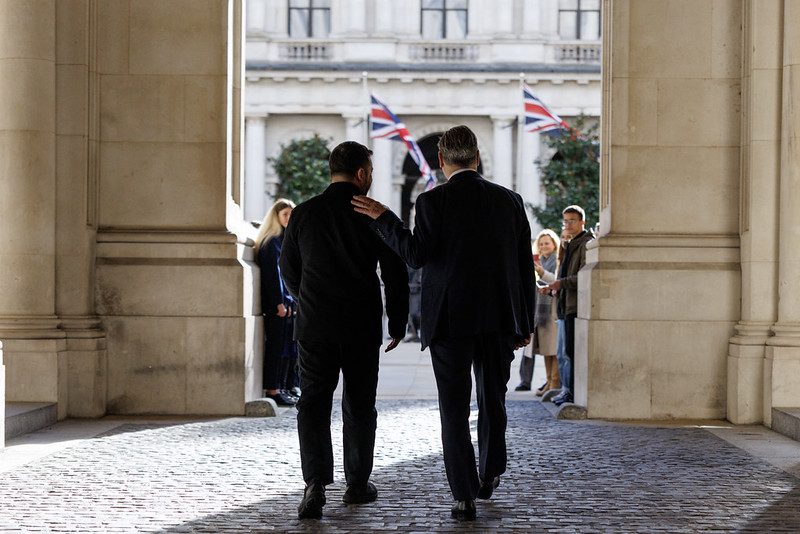
Image: Prime Minister Keir Starmer and President Zelenskyy – Simon Dawson / No 10 Downing Street
The contrasting rhetoric highlights the diplomatic gap: while Western leaders, including Starmer, insisted Vladimir Putin was the “only person” who wanted the war in Ukraine to continue and rejected his demands for Ukrainian lands as “ludicrous”, Moscow continues to portray itself as the victim of Western aggression while keeping the possibility of a Trump-Putin dialogue open.
The meeting thus concluded not just with pledges of aid, but with a clear statement that the West has committed to a decisive escalation of economic and military pressure, betting that this is the only path to forcing a lasting peace.
Featured Image via Lauren Hurley / No 10 Downing Street

